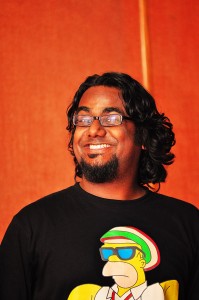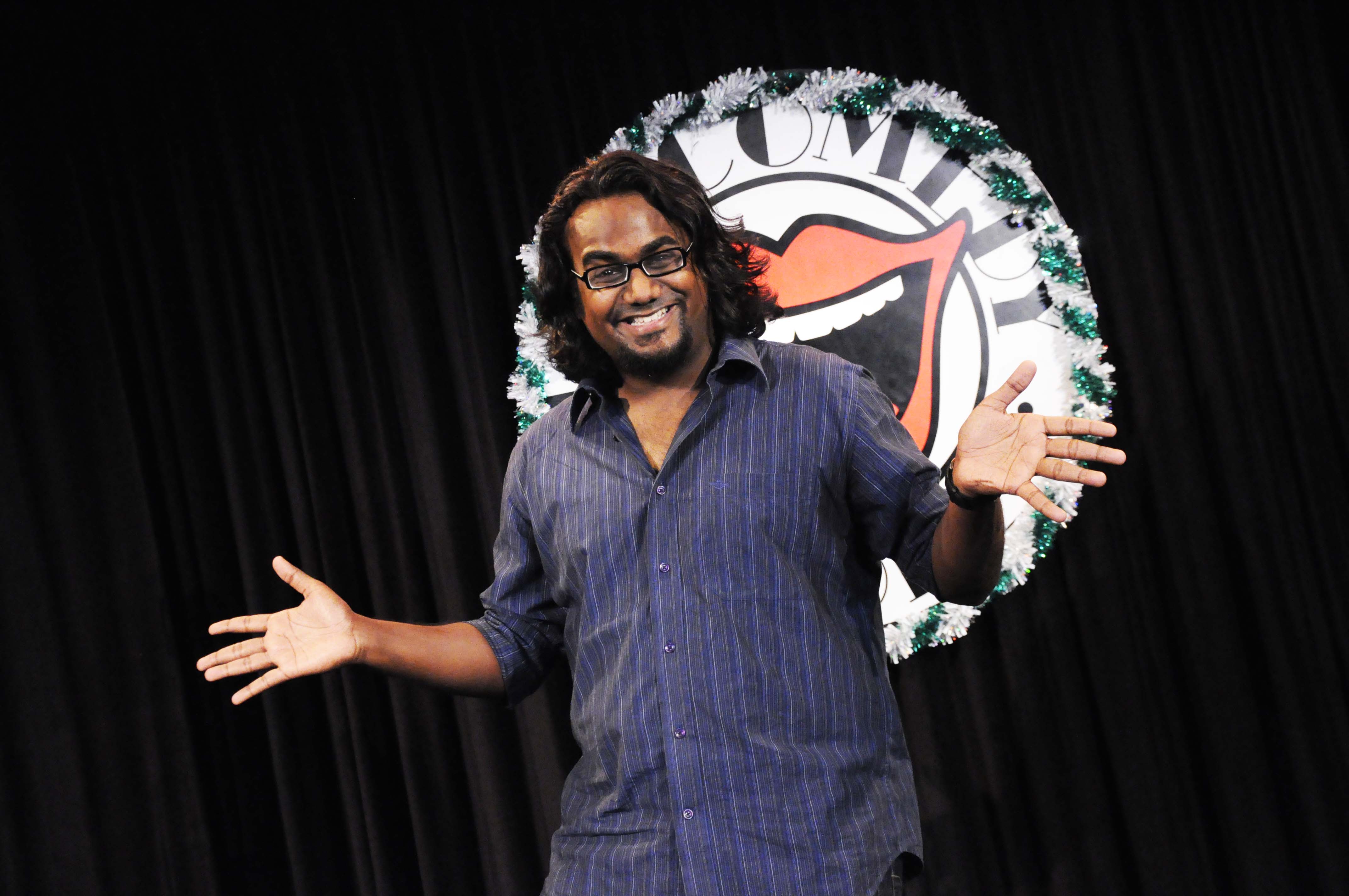…is why Ashish Shakya does stand up comedy, and also because his comedy has gone ‘from sh*t to less sh*t’.
by The Editors | editor@themetrognome.in
Ashish Shakya is 28, and funny as hell.
He ‘mooned the college after he finished engineering studies.’ His first stand-up act ‘was the opposite of funny and smart’. He kept going at stand-up comedy till he ‘went from shit to less shit’. And, he says, ‘as a comic, all you can do is put in every bit of energy and talent that you have, take your money and go home feeling a little bit like a whore.’
In a hilarious interview, the Bandra resident tells The Metrognome about his chosen profession, performing to stony silences, writing funny stuff every week for television and what aspiring stand-up comics and humour writers need to consider before taking the plunge into the business of comedy.
When did you first realise you were funny, that you had the ability to get a laugh? Was there a moment of epiphany?
There is no real single instance that served as an epiphany. At some point, you just develop some sort of a personality, and mine turned out to be the guy that was probably dropped on his head as a kid, making sure he’d never have anything close to a normal thought process. As such, the choice is between comedy and serial killing. I do the former because I lack the discipline that serial-killing requires.
And yes, I imagine that my parents were my first audience, although kids say stupid things that parents laugh at because they have to. If I was in their place, I would ask for a refund.
You studied engineering. What did you do after you finished college?
Mooned the college and thanked the universe that it was over. Drank a lot. Also, started working with a youth magazine called JAM about a week after my final exams, because, well, I needed to make up for lost time.
How has your educational background as an engineer helped your sense of humour? And why are there so many engineers in the media?
 I had lots of free time in engineering college, since I didn’t really bother with all that pesky studying nonsense. That free time may have helped warp my mind a fair bit, and that’s always a good thing for comedy. As far as the glut of engineers in the media (or even other non-tech fields) is concerned, it’s probably because engineering is the default option for most kids in India. It’s also easy to get into. But the blinkers come off once you’re in college and by then it’s too late, so you just sit around, biding your time until one day, you’re free AND CAN DO WHATEVER THE F**K YOU WANT BECAUSE YOU’RE YOUNG AND FOOLISH WOOHOO!
I had lots of free time in engineering college, since I didn’t really bother with all that pesky studying nonsense. That free time may have helped warp my mind a fair bit, and that’s always a good thing for comedy. As far as the glut of engineers in the media (or even other non-tech fields) is concerned, it’s probably because engineering is the default option for most kids in India. It’s also easy to get into. But the blinkers come off once you’re in college and by then it’s too late, so you just sit around, biding your time until one day, you’re free AND CAN DO WHATEVER THE F**K YOU WANT BECAUSE YOU’RE YOUNG AND FOOLISH WOOHOO!
When did you first start writing? What was it about?
I started really late in life. 17 or so, I would think, and it was during the first semester of engineering college. In a blinding flash of originality, I wrote bullshit poetry about life or some such nonsense. Teenagers are stupid, no?
Your writing has a very obvious Dave Barry-ish turn of phrase. Apart from him, which humour writers have influenced your writing?
Barry’s the writer who taught me all about form, structure and all the other boring nuances that go into great humour writing. Apart from him, I think Charlie Brooker and P J O’Rourke are great fun.
What was your first stand-up comic gig like?
The first time was three years ago, at the open mic organised by Vir Das and company at Blue Frog, called Weirdass Hamateur Night. There were 15 contestants, who got two minutes each. I wrote about being a North Indian or something, and it was the exact opposite of funny and smart. I ran it past a few people before the show, and it still wasn’t funny. I rewrote it the night before and took copious amounts of drugs before going on stage. People laughed, which was nice of them and ensured that they didn’t get to see a grown man cry on stage. I took part in the next open mic as well, which I won, which bought me more time on stage. It turned out that I liked the spotlight and the instant gratification, so I kept doing it until I went from shit to less shit. At some point, money came in and that wasn’t too bad either. The Comedy Store came here in 2010, and that helped a lot in terms of stage time.
Have you ever had a ‘bad act’, for example where the audience was a bunch of tough customers that didn’t crack a smile all the time you were on stage?
Oh, lots. I’ve walked on to boos, I’ve performed to stony silences, where the only sound you can hear is the sound of your self-esteem being run over by a truck. Corporates usually tend to be tough, because hey, if you’re at a swanky office party, where the booze is free and frankly, above your pay grade, you’re not going to give a sh*t about some ugly dude talking on stage. You have other concerns, such as killing your liver or hitting on that hot chick from HR. As a comic, all you can do is put in every bit of energy and talent that you have, take your money and go home feeling a little bit like a whore. My worst gig was when I was accosted by members of a right-wing fanatic party because they didn’t like a certain joke I had made. I can’t really tell you the joke now, because if they read it, they will set fire to the Internet. It would suffice to say that I was threatened with grievous bodily harm, unless I apologised on stage, so I did, because I like having my limbs attached to my body at all times.
What do you do when you sense your act is not going well?
I wish that I had listened to my mother and worked hard to become one of those corporate types sitting in the audience, not laughing, as opposed to the idiot on stage.
All you can do is to switch your material around in your head, and do stuff that you think might get them laughing. Sometimes heavy or smart stuff is met with a silence, so you try and switch to easier jokes. If all that fails, go home and have a crisis or two.
You write ‘The Week That Wasn’t’. How did you land this assignment? What is it like working with Cyrus and Vijay?
I called Kunal and told him I wanted to write. I set up a meeting, delivered a sample script and a few sexual favours later, I got the job. I have written more than 200 episodes (that’s four-odd years on a weekly) so I know their styles and can write accordingly. That bit is fine – the difficulty lies in being funny and smart every week, about topics that often stay the same. I mean there are only so many Manmohan Singh jokes you can do before you wish that he does acid in Parliament or something, so that you have something new to talk about.
There are very few humour columnists in the city today. How did you break into humour writing for newspapers?
I went to a dance bar. No, seriously. I went to a dance bar because I was fascinated by the whole subculture and wanted to write about it. That experience turned into a 3,000-word piece which sat around gathering dust on my blog, until I felt I wasn’t doing enough in life, so I shot off emails to a bunch of papers. HT was revamping at the time, and they liked the piece. A couple of sample columns later, I was in.
Have you ever received irate letters from readers about any of the columns you’ve written?
Very few irate letters actually. Most people are nice and understanding. That’s probably because a lot of stupid people aren’t reading my column yet. I wonder what will happen when they do. I have gotten some hate on my work about religion and politics, but weirdly enough, the most vitriol I have ever received was after I wrote about how sport fans are stupid and annoying. People take that shit really seriously. It’s hilarious.
When you’re working on material for a stand-up act, what are some of the things you have to keep in mind?
If it’s for a corporate, then you may need to write clean stuff. But that aside, we get to say pretty much what we want. Consistency is difficult, and you always want to write better and funnier than you were writing the day before. A lot of first thoughts need to be thrown out. Apart from that, you just need to have fun writing.
Who, in your opinion, are some of the best stand-up comics in India today? Around the world?
Vir Das. Also, Anuvab Pal is great. As are Rohan Joshi, Tanmay Bhat and Gursimran Khamba. These are guys who set the bar pretty high.
Among the international comics, Louis CK, Chris Rock, Ricky Gervais and Bill Maher are just a few of the guys I look up to.
What advice would you give aspiring stand up comics and humour writers?
Write, write, write, perform, perform, perform, edit, re-write, rehearse, rehearse, rehearse, write, write and write some more. And when you’re not doing that, watch stand-up, listen to stand-up, read, consume and devour as much and as varied content as you can. Do different things, feed your brain, avoid clichés and monotony and be honest. It shows when you are, and more importantly, it shows when you aren’t.
(Pictures courtesy The Comedy Store and Ashish Shakya)


